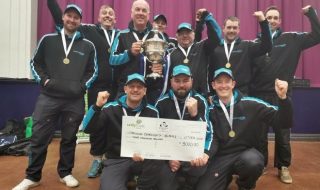ANGLERS HAVE welcomed the announcement by Fisheries and Conservation Minister, Ben Bradshaw, on the relaxation of the licence application process for shooting cormorants.
Cormorant numbers hunting inland have increased dramatically over the past three decades, and it is now widely accepted that they can cause significant damage to fish stocks and fisheries. Currently, some 23,000 birds over-winter in
Defra has been conducting a review of the Wildlife and Countryside Act 1981, which implements the EU Birds Directive and applies conditions under which birds causing a nuisance may be controlled, including shooting as a means to scaring. The main points to come from this review, and included in the Minster¡¦s statement, are detailed below.
This concludes several years of lobbying by angling and fisheries organisations on the issue, and a few recent weeks of intensive consultation between Defra and the Moran Committee Bird Group, represented by its Chairman, National Association of Fisheries and Angling Consultatives¡¦ Terry Mansbridge, and the Salmon & Trout Association¡¦s Paul Knight.
Terry Mansbridge said, ¡§We welcome these changes of policy by Defra, which will significantly improve the ability of fishery managers to protect their fish stocks whilst not affecting the conservation status of the birds. Our thanks to the Minister and his department, and to Martin Salter MP for his efforts on our behalf.¡¨
Paul Knight agreed. ¡§We particularly welcome the added protection this will give vulnerable migrating salmon and sea trout smolts, together with spawning coarse fish and recently stocked fish in still waters.¡¨
Both added, ¡§It is now up to all fishery managers to use the new and improved procedures, if they have a problem with cormorants. We believe that this will allow fishery managers to redress the local balance between inland avian predators and freshwater fish populations, without causing undue impact on national cormorant numbers. It is a responsible compromise which meets the need to protect fish stocks as well as birds¡¨.
Lord Moran, Chairman of the Moran Committee, said, ¡§all anglers should be grateful to Terry Mansbridge and Paul Knight and their colleagues on the Committee¡¦s Bird Group for their unremitting efforts to bring about a sensible solution to this problem, which has now been achieved. We must also be grateful to Ben Bradshaw, who has listened to what our Committee has been saying and given us a fair set of measures which should reduce the damage done to fisheries by cormorants while preserving reasonable numbers of birds and fish.¡¨
„h Total number of birds licensed to be raised from about 600 to 2,000 per year, with the ability to increase to 3,000 if deemed necessary, or to decrease if conservation is threatened.
„h An easier application process, where presence of cormorants is proof enough of potential impact without having to submit evidence of actual damage.
„h The ability for Defra to grant a licence for two years without the need to reapply for the second year.
„h Under special circumstances, extension of the shooting season to May 1st, particularly to protect salmon and sea trout smolts on their downstream migration.
„h The Environment Agency and other Defra agencies are to be urged to take notice of these
The Moran Committee, chaired by Lord Moran, is the united voice for all the main fisheries and angling groups in
The Moran Committee Bird Group started meeting in January 2001 to develop constructive dialogue and co-operation between anglers, fishery interests and bird interests. The aim of the Committee is to identify common ground on the bird predation issue and to ensure that a reasonable balance is struck between the need to conserve both fish and birds. Members are committed to finding acceptable management strategies to what can be a challenging situation. The website www.cormorants.info is managed by the Moran Committee Joint Bird Group members.






